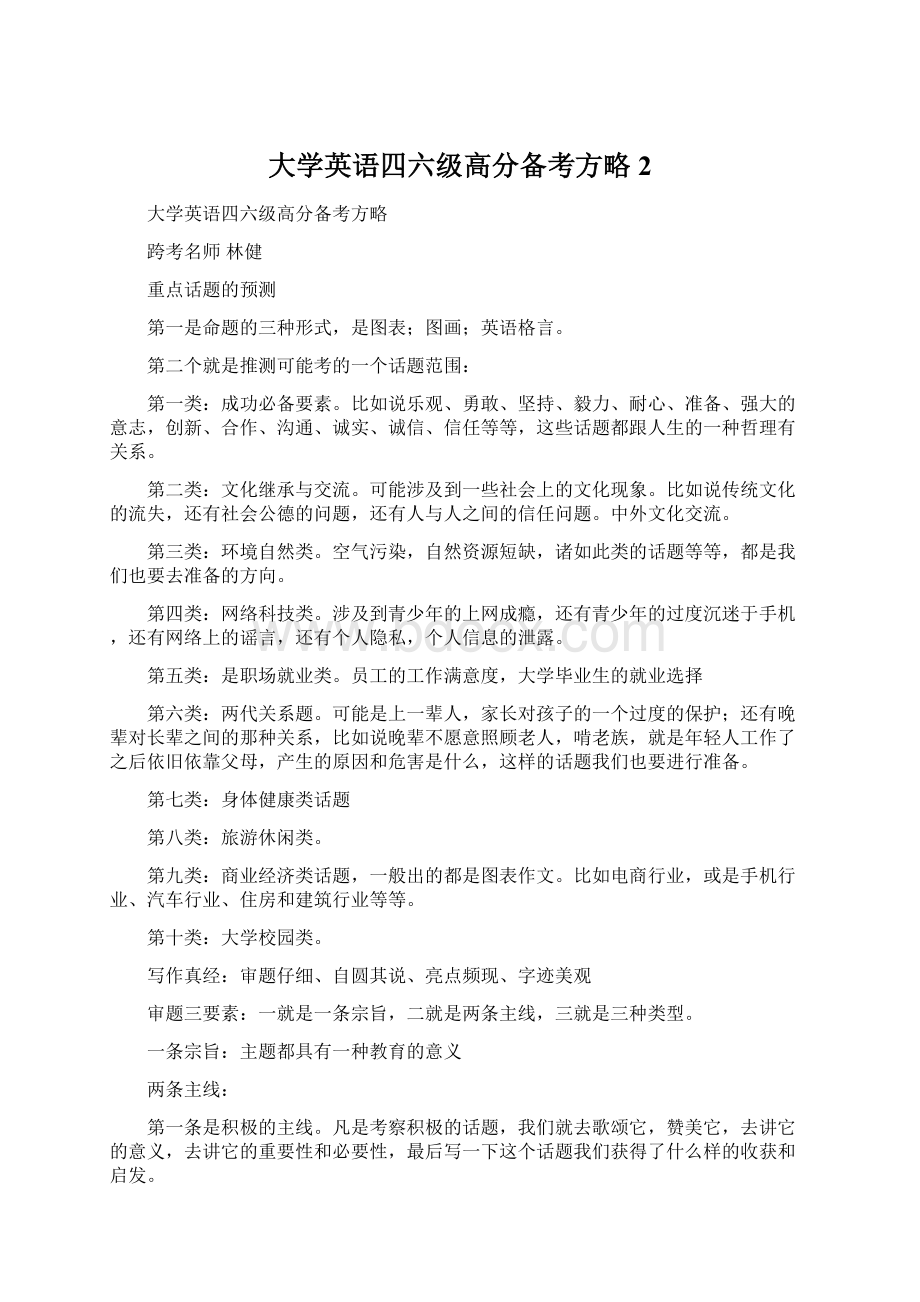大学英语四六级高分备考方略2Word文档下载推荐.docx
《大学英语四六级高分备考方略2Word文档下载推荐.docx》由会员分享,可在线阅读,更多相关《大学英语四六级高分备考方略2Word文档下载推荐.docx(20页珍藏版)》请在冰豆网上搜索。

还有晚辈对长辈之间的那种关系,比如说晚辈不愿意照顾老人,啃老族,就是年轻人工作了之后依旧依靠父母,产生的原因和危害是什么,这样的话题我们也要进行准备。
第七类:
身体健康类话题
第八类:
旅游休闲类。
第九类:
商业经济类话题,一般出的都是图表作文。
比如电商行业,或是手机行业、汽车行业、住房和建筑行业等等。
第十类:
大学校园类。
写作真经:
审题仔细、自圆其说、亮点频现、字迹美观
审题三要素:
一就是一条宗旨,二就是两条主线,三就是三种类型。
一条宗旨:
主题都具有一种教育的意义
两条主线:
第一条是积极的主线。
凡是考察积极的话题,我们就去歌颂它,赞美它,去讲它的意义,去讲它的重要性和必要性,最后写一下这个话题我们获得了什么样的收获和启发。
第二条是消极的主线。
负面问题在命题的时候是希望考生能够去对这个负面问题进行一定的思考,分析产生的原因和危害。
最后给出你想如何规避这个问题的一些解决方案
三个类型:
第一种是与个人相关的积极话题,也就是人生哲理话题,乐观、坚持、梦想、创新、合作、沟通等等,
第二种是社会的中性和积极话题。
比如说社会上的社会美德问题,社会公德问题,还有文化融合问题,文化交流问题都是。
第三类话题是社会负面话题,比如动物的过度捕杀,环境污染,商品过度包装。
写作黄金模板(漫画类模板1示范)
开头通用模式
AfairlycompellingpictureleapedoffthepagetheminuteIcaughtsightofthistestpaper.Asisgraphicallyportrayedintheabovedrawing,_描述漫画______.Thecartoonist’srealpurposeisnotthefactitself,buttoleadustodetecttheinformativemessagebehindit.(通用)
1.设计问题(第一段结尾)
①Thenpeoplemaywonderwhataretherealcausestriggeringthisphenomenon?
②Thenpeoplemayworrywhatnegativeconsequencesthiswillbringabouttous?
③Thenpeoplemaywonderwhatpositiveconsequencesthiswillbringabouttous?
④Thenpeoplemaybecurioushowmanywaysonearthwecanemploytohavethisnutcracked?
第二段万能理由
1.相关部门出台优惠政策
Relevantauthoritieshaveissuedfriendlypoliciestoprotectandpromotethefurtherdevelopmentof__行业(如E-commerce/tourism/fastfood/show/realestate/lowcarbon_____industry.
2.人们可支配收入和购买力提高
Alongwiththequickeningdevelopmentofmarketeconomy,peoplehavemoredisposableincomeandpurchasingpower.,whichenablesthemtoaffordtheonce-deemed-expensiveexpense.
3.监管不力助长了某趋势的蔓延
Thesupervisionsystempracticedtodayisnotstrictlyobserved,whichhasinevitablyencouragedtheundesirabletrend.
4.压力
Withthequickeningpaceoflife,competitiongoesincreasinglyfierceinallwalksoflife,imposingtremendouspressureonallindividuals.Thepastyearshavewitnesseddramaticincreaseinthedifficultyofexaminationsandemployment//maintaininglifequality//housing.
5.便利
Peopleinmountingnumbersaretemptedtotheconveniencebroughtby
6.短视
Thirty-plusyearsintothereformandopeningup,theChinesesocietyhasrecognizeditselfinawaythatputsanexcessivehighpremiumonimmediateinterestover(如environmentalprotection.
7.变革中的社会缺乏意识
Thesocietyasawhole,beingcontinuouslytransformed,hasignoredthenegativeconsequencesof(主题)
第三段解决问题
1.Admittedly,it’snouseonlybeingawareoftheseriousnessofthis.Actionsspeaklouderthanwords.Promptcountermeasuresshouldbeimplementedtohavethisnutcracked.Itisimperativethatrelevantlawsandregulationsbeunveiledandenforcedtoharnessandcurbthisdisturbing//undesirable//trend.Theawarenessof_________shouldbeenhanced.Onlyinaharmoniousatmospherecanwehopetowitnesstheidealparadiseinwhichpeoplecanenjoytheirlifetotheuttermost.
第二部分听力
【Sample】
1.W:
Ijustheardaboutareallybeautifulparkintheeastendofthetown.Therearealotofrosesinbloom.
M:
Whydon’twewalkoverthereandseeforourselves?
Q:
Whatwillthespeakersprobablydo?
2.M:
Mypresentationisscheduledfor9:
30tomorrowmorningatthelecturehall.Ihopetoseeyouthere.
W:
Oh,sorry.IwasabouttotellyouthatIhaveanappointmentwithmydentistat9:
00o’clocktomorrow.
Whatdowelearnaboutthewoman?
3.M:
Haveyoureadthenewsonthecampusnet?
Susanhaswonthescholarshipfornextyear.
Iknewshewouldfromtheverybeginning.Suchabrilliantanddiligentgirl!
Shecertainlydeservesit.
Whatdoesthewomanmean?
4.W:
TakingabustoMiami,it’scheaperthangoingbytrain.
That’strue.ButI’dratherpayalittlemorefortheaddedcomfortandconvenience.
Whatdoesthemanmean?
考生听力的高低完全取决于他们是否具备了以下4个方面的基础:
一.坚实的语言基础
二.一定的文化背景知识
三.基本的听力技能
四.正确有效的听音习惯
1听,做题、2.对照原文听画出不懂部分3.背诵或模仿
4.跟读5.听写考点句
听力材料的选材原则一般基于以下三点:
一.对话部分为校园生活中的一般对话,句子结构和内容不太复杂.
二.短文部分的材料是题材熟情节不太复杂的故事、讲话或叙述等.
三.所用词汇不超过教学大纲词汇表规定的范围.
注意事项:
1.保持良好的心态,头脑要冷静,一个题听不懂不要过多纠缠。
善于利用时间:
(1)播放考场指令时,题目说明和例句时.
(2)题与题之间的15秒间隔利用好阅读选项,猜测谈话话题和可能问的问题:
听前从所给的文字材料和答案选项等线索中发现一些背景信息,力求缩小谈话者的话题,它能帮助考生搞清所听内容的类型和结构甚至主题。
考生听的时候可避免过分注重每个单词从而影响对全篇中心思想的理解。
考生应抢时间阅读试卷上的选项,争取主动,以便在听音时有针对性。
根据选项猜测问的是时间、地点、人物、金钱、还是计划、打算、状态等等。
2.阅读选项要一目十行,提高效率:
听力不像阅读,它是单向性的、一次性的。
时间有限,提高阅读选项的速度。
3.手耳并用,简单做笔记:
录音中的细节,如重要的数字、人物、地名等,仅大脑记忆很难完全记住。
因此,考试中可以有目地的、有选择的加以记录,以便听完录音后能快速准确的选出答案。
4.多做真题。
十多年来的每年两度的考试,光是真题就积累了几十套了。
这些真题的命题还是很有规律可循的。
要找四级的感觉,就得多做真题。
一.简短对话部分:
该部分一般是日常生活中的对话,即衣、食、住、行、工作、学习、生活等话题,场景可分为校园、公共场所(银行、机场、医院、邮局、交通工具等)、家庭、办公室等方面。
每题1分。
简短对话的形式:
一般是男士说一句,女士说一句,然后根据他们的对话内容由第三方提出一个问题。
该部分一般是日常生活中的对话,即衣、食、住、行、工作、学习、生活等话题,场景可分为校园、公共场所(银行、机场、医院等)、家庭、办公室等方面。
简短对话的类型:
按照简短对话的内容或句型,我们可以把该部分分为以下类型:
问对话发生的地点和场所:
Wheredoestheconversationmostprobablytakeplace?
Wheredoesthisconversationmostlikelyoccur?
Wherearethetwospeakers?
不同的场景下人们交谈用语也不同,例如:
校园:
campus,dorm,library(renewthebooks,overdue,payafine,bookshelf),lab,canteen,roommate,professor,semester,term,pass,fail,exam,course,credit,resume,tutor,graduate,presentation,speech,report,lecture,paper,scholarship等。
银行:
openanaccount,cashthecheck,buytraveler'
scheck,ATM,draw/depositmoney,balance,savings等。
餐馆:
menu,atablefortwo,atableinthecorner/bythewindow,full,ondiet,treat,order,course,salad,wine,dessert,waiter,reserve,takeorder等。
机场:
board,flight,gatenumber,checkin,boardingpass,seat-belt等。
交通:
duetoarrive,fasttrain,non-stoptrain,xxminuteslate,postpone,delay,breakdown,trafficjam,flattire,speeding,payafine等。
医院:
Doyouhaveanappointment?
What'
sthematterwithyou?
takeone'
stemperature,haveafever,haveasorethroat,keepcoughing,toothache,headache,physician,surgeon,doctor,nurse,operation-room,emergencyroom,ward,visitinghours,prescribe,pill,capsule等。
邮局:
businesshours,parcel,postage,letter,stamp等。
家庭:
darling,sweetheart之类的比较亲近的称谓语,watchTV,fixthewashingmachine,grocery,mowthelawn,sofa,kitchen,dining-room,haveabath等。
旅馆:
checkin/out,makeareservation,register,receptiondesk等。
找房子:
价格高,太吵,难找.
这样的问题的答案选项一般是由介词in或at后面加一个地点构成的。
如:
M:
Howmanyhoursareyoutakingthissemester?
W:
Eighteen,plustwohoursoflab.
Q:
Wheredoestheconversationmostprobablytakeplace?
A.Inarestaurant.B.Inabank.
C.Atanoffice.D.Inauniversity.
该题的关键词是semester和lab.
提问人物关系或人物的身份:
此类对话提供一个情节,能反映所涉及的人的关系或身份,关键词可以参考第1点中列出的。
(1)问人物的关系:
What'
stheprobablerelationshipbetweenthetwospeakers?
如:
Goodevening,Madam.Thereisatablefortwooverthere.Thisway,please.
Thankyou.CouldIseethemenu,please?
What'
stherelationshipbetweenthemanandwoman?
A.Husbandandwife.B.Waiterandcustomer.
C.Salesmanandcustomer.D.Hostandguest.
该题的关键词是menu和Madam.
(2)问人物的职业身份:
Whoistheman/thewoman?
Accordingtoyouradinthismorning'
spaper,youhaveanapartmentforrent.
Yes,Ihave.It'
sonthesecondfloor.Wouldyouliketohavealook?
Comethisway,please.
Whoisthewoman?
A.Abankclerk.B.Asecretary.
C.Alandlady.D.Adoctor.
该题的关键词是anapartmentforrent和ad.
计算类。
一般涉及时间和价钱的运算。
(1)问活动发生的时间或具体几点。
该类的题一般不会直接告诉我们时间,会涉及到时间的一些简单的加减运算。
要注意一些关键词,如:
aquarter(to/past),half(past),daily,weekly,fortnight等。
Bob,areyougoingstraighthomeafterschooltoday?
M:
No.Ihaveaclassuntiloneo'
clock,andafterthatI'
mgoingtospendacoupleofhoursatthelibrarybeforegoinghome.
WhenisBobgoinghomethisafternoon?
A.Around5:
00.B.Around3:
00.
C.At2:
00.D.At1:
本题的关键是untiloneo'
clock,和tospendacoupleofhoursatthelibrarybeforegoinghome。
(2)商品的价格。
该类的题也涉及到一些简单的加减乘除运算。
10%off,discount,double,halftheprice,couple,pair,dozen,arealbargain,onsale,change等。
尤其要注意单件商品的价格,买多件商品是否优惠,找零,以及最后的问题是说话人要付的钱、单件商品的价格、还是买若干商品需要付的钱。
Here'
saten-dollarbill.Givemetwoticketsfortonight'
sshow,please.
Sure.Twoticketsandhere'
sadollarfortycentschange.
Howmuchdoesoneticketcost?
A.$8.60.B.$4.30
C.$6.40.D.$1.40
本题的关键是ten-dollarbill,twotickets,adollarfortycentschange.
人物的计划或打算。
这类问题中第一个说话人往往会提出一种观点或提议或建议,要仔细听第二个说话人是同意还是反对。
(1)第二个说话人同意第一个人的观点或提议或建议. 如:
W:
Youneedarest.You'
vefinishedyourexams.Sowhydon'
tyougoawaysomewhereforalongweekend?
That'
sagoodidea.PerhapsMonicawillcomewithme.
Whatwillthemanprobablydo?
A.Tohaveagoodrest.
B.ToseeMonica.
C.Togoabroadfortheweekend.
D.Totakeanexam.
本题的关键是That'
sagoodidea,说明第二个说话人同意第一个说话人的观点。
(2)第二个说话人不同意第一个人的观点或提议或建议,大多数情况下是礼貌委婉地表达自己的不同意见,所以要特别注意:
Mary,wouldyouliketogotothemovieswithmeafterdinner?
Well,I'
llgoifyoureallywantmeto,butI'
mrathertired.
Q:
Whatcanwelearnfromtheconversation?
A.Thewomandoesnotwanttogotothemovies.
B.Themanistootiredtogotothemovies.
C.Thewomanwantstogotothemovies.
D.Themanwantstogooutfordinner.
本题的关键是…but…
人物的感觉状态。
除了根据说话人的语气判断之外,对话中出现的关键词可能有:
excited,disappointed,overjoyed,relieved,upset,unhappy,blue,depressed,relaxed,anxious,tense,worried,angry等。
Weren'
tyounervouswhentheprofessorcalledonyouinclass?
I'
dsayIwasshakingallover.
Howdidthemanfeelwhenhewascalledon?
A.Worriedandfrightened.
B.Ver